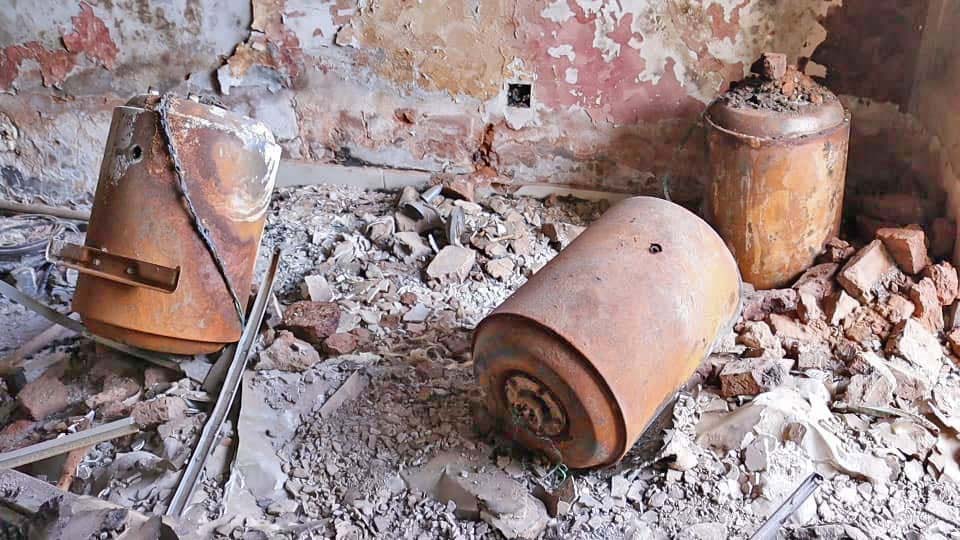Sudan war enters its seventh month

Homes and shops in Burri in Khartoum destroyed by bombing (Photo: Saeed Abdelmajeed)
The war in Sudan entered its seventh month yesterday, as violent clashes continued between the Sudan Armed Forces (SAF) and Rapid Support Forces (RSF) in greater Khartoum. The Forces of Freedom and Change-Central Council (FFC-CC) said that the war has expanded into El Gezira and White Nile states, as the US embassy called for access to humanitarian aid.
Intense confrontations continued this week between the SAF and RSF in the Sudan capital Khartoum and its sister cities Omdurman and Khartoum North. The fierce fighting between the Sudanese army and its paramilitary counterpart in Khartoum continues unabated, with an increasing number of civilians being hit. El Nau Hospital in Omdurman, one of the only remaining functional hospitals in the region, was hit by a shell.
The resistance committee of El Sabil in Omdurman’s Ombadda reported that the RSF detained 18 people in the neighbourhood since Saturday. In a press release, the committee said that the detentions include a large group of young men in the area who were taken to an unknown destination.
The statement held the RSF accountable for the security and safety of civilian detainees, demanding their immediate release.
In a separate statement yesterday, the Darfur Bar Association condemned the detention of three lawyers by the RSF, who were released yesterday, namely Jalaleldin El Haj, Abdallah Abdelrahman, and Mohamed Banjo.
The organisation said that the RSF is targeting lawyers and human rights defenders. It condemned the violations and abuses committed by the RSF and demanded that it stop its “repeated violations” and release all detainees. It also demanded that the Military Intelligence release all detainees in its custody.
In September, Emergency Lawyers documented a record number of detention centres in wider Khartoum and lamented the “horrific escalation” of arbitrary detentions, torture, and even deaths while in custody.
Expansion of war
The FFC-CC said in a statement that the war is expanding across the borders of El Gezira and White Nile state. This brings the number of states within its scope to ten.
He pointed out the huge losses that affected the country’s overall economy, including the infrastructure of industrial companies in Khartoum state, which represent about 80 per cent of industrial output in the country. He pointed to the loss of 80 per cent of revenues and the increase in service fee prices with the collapse of banking sector services and the collapse of the national currency’s prices against foreign currencies.
The FFC confirmed that a lot of aid that has arrived in the country has not found its way to those in need, and is instead being sold on the open market. There have been many reports of aid being halted, blocked, or used to disguise weapons since the outbreak of the war in Sudan.
The international movements of the FFC-CC have reportedly led to the “crystallization of a regionally unanimous position for Sudan’s neighbouring countries” to end the war as quickly as possible. The statement explained that “the path towards building the broadest civil front to end the war, achieve peace, and restore the democratic civil transition is moving forward.” It called on both parties to stop the war, put an end to the suffering, and head to the negotiating halls in Jeddah, Saudi Arabia, “to bring the curtain down on this disastrous war.”
Humanitarian aid
The US embassy in Khartoum called on the army and the RSF to immediately stop the fighting and end the conflict through negotiation. In a statement marking the six-month anniversary of the outbreak of war in Sudan, the embassy called for unimpeded access to humanitarian aid and the protection of civilians and their human rights.
Noting that the US is considered the largest humanitarian donor to Sudan, the statement said that “humanitarian actors are bravely responding, but they are struggling to reach those in need because of intense fighting and impediments imposed by SAF and RSF.”
The embassy also called on the warring parties to comply with international humanitarian law and the Jeddah Declaration of Principles. “In the context of a negotiated exit from the conflict, Sudan’s democratic transition must be restored with the transfer of power to a civilian transitional government,” said the statement.
According to the UN Office for the Coordination of Humanitarian Affairs, aid organisations need USD 2.6 billion to assist and protect Sudanese until the end of 2023. UN aid organisations have so far reached 3.6 million of the 18 million people in urgent need of assistance.
More than 190 people have reportedly been killed in bombardments south of Khartoum. UN Resident and Humanitarian Coordinator in Sudan Clementine Nkweta-Salami said that the country has become the world’s fastest-growing displacement crisis.











 and then
and then